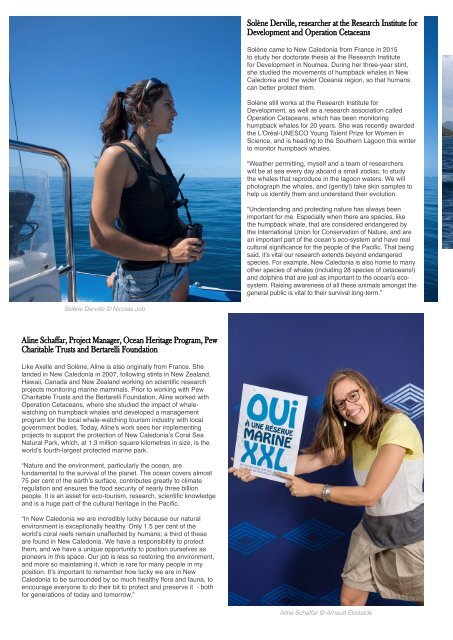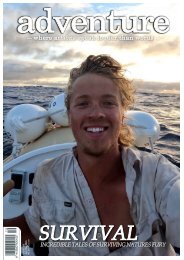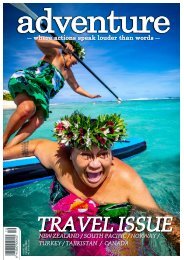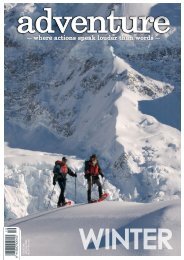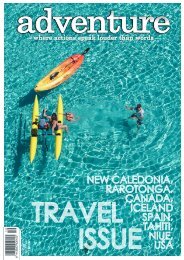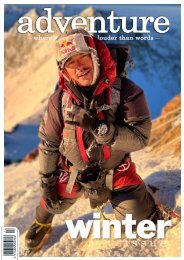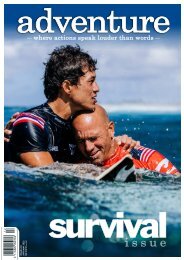Adventure Magazine Issue 221
Women's issue of Adventure
Women's issue of Adventure
You also want an ePaper? Increase the reach of your titles
YUMPU automatically turns print PDFs into web optimized ePapers that Google loves.
Solène Derville, researcher at the Research Institute for<br />
Development and Operation Cetaceans<br />
Solène came to New Caledonia from France in 2015<br />
to study her doctorate thesis at the Research Institute<br />
for Development in Noumea. During her three-year stint,<br />
she studied the movements of humpback whales in New<br />
Caledonia and the wider Oceania region, so that humans<br />
can better protect them.<br />
Solène still works at the Research Institute for<br />
Development, as well as a research association called<br />
Operation Cetaceans, which has been monitoring<br />
humpback whales for 20 years. She was recently awarded<br />
the L'Oréal-UNESCO Young Talent Prize for Women in<br />
Science, and is heading to the Southern Lagoon this winter<br />
to monitor humpback whales.<br />
“Weather permitting, myself and a team of researchers<br />
will be at sea every day aboard a small zodiac, to study<br />
the whales that reproduce in the lagoon waters. We will<br />
photograph the whales, and (gently!) take skin samples to<br />
help us identify them and understand their evolution.<br />
“Understanding and protecting nature has always been<br />
important for me. Especially when there are species, like<br />
the humpback whale, that are considered endangered by<br />
the International Union for Conservation of Nature, and are<br />
an important part of the ocean’s eco-system and have real<br />
cultural significance for the people of the Pacific. That being<br />
said, it’s vital our research extends beyond endangered<br />
species. For example, New Caledonia is also home to many<br />
other species of whales (including 28 species of cetaceans!)<br />
and dolphins that are just as important to the ocean’s ecosystem.<br />
Raising awareness of all these animals amongst the<br />
general public is vital to their survival long-term.”<br />
Baleine © Catamania_NCTPS<br />
Geneviève Briançon, Aline Guémas, Marilyn<br />
Sarocchi, Claire Goiran, Monique Zannier,<br />
Monique Mazière, Cathy Le Bouteiller and Sylvie<br />
Hébert, citizen researchers, otherwise known as<br />
the ‘Fantastic Grandmothers’<br />
The Fantastic Grandmothers is a group of ladies<br />
aged 62 to 75, each of whom love to swim. They<br />
were approached by a local researcher in 2017 to<br />
ask if they would help find and document sea snakes,<br />
which live and feed in the bays around Noumea. The<br />
group said yes and spend an average of two hours<br />
a day in the water photographing and counting the<br />
sea snakes and observing other marine species in<br />
the area.<br />
“New Caledonia is home to exceptional flora and<br />
fauna, both on the land and in the ocean. Our<br />
observation ground may only be a tiny part of the<br />
Caledonian lagoon, but it is incredibly rich. Our duty<br />
is to protect it. Through our research, we strive to<br />
educate people about New Caledonia’s exceptional<br />
biodiversity and report all possible pollutants, to try to<br />
protect New Caledonia’s waters. The goal is to make<br />
people aware of all this beauty, and the role of each<br />
species in relation to others.”<br />
Solène Derville © Nicolas Job.<br />
Aline Schaffar, Project Manager, Ocean Heritage Program, Pew<br />
Charitable Trusts and Bertarelli Foundation<br />
Like Axelle and Solène, Aline is also originally from France. She<br />
landed in New Caledonia in 2007, following stints in New Zealand,<br />
Hawaii, Canada and New Zealand working on scientific research<br />
projects monitoring marine mammals. Prior to working with Pew<br />
Charitable Trusts and the Bertarelli Foundation, Aline worked with<br />
Operation Cetaceans, where she studied the impact of whalewatching<br />
on humpback whales and developed a management<br />
program for the local whale-watching tourism industry with local<br />
government bodies. Today, Aline’s work sees her implementing<br />
projects to support the protection of New Caledonia’s Coral Sea<br />
Natural Park, which, at 1.3 million square kilometres in size, is the<br />
world’s fourth-largest protected marine park.<br />
“Nature and the environment, particularly the ocean, are<br />
fundamental to the survival of the planet. The ocean covers almost<br />
75 per cent of the earth’s surface, contributes greatly to climate<br />
regulation and ensures the food security of nearly three billion<br />
people. It is an asset for eco-tourism, research, scientific knowledge<br />
and is a huge part of the cultural heritage in the Pacific.<br />
“In New Caledonia we are incredibly lucky because our natural<br />
environment is exceptionally healthy. Only 1.5 per cent of the<br />
world’s coral reefs remain unaffected by humans; a third of these<br />
are found in New Caledonia. We have a responsibility to protect<br />
them, and we have a unique opportunity to position ourselves as<br />
pioneers in this space. Our job is less so restoring the environment,<br />
and more so maintaining it, which is rare for many people in my<br />
position. It’s important to remember how lucky we are in New<br />
Caledonia to be surrounded by so much healthy flora and fauna, to<br />
encourage everyone to do their bit to protect and preserve it - both<br />
for generations of today and tomorrow.”<br />
Aline Schaffar © Arnaud Elissalde<br />
The Fantastic Grandmothers<br />
newcaledonia.travel


